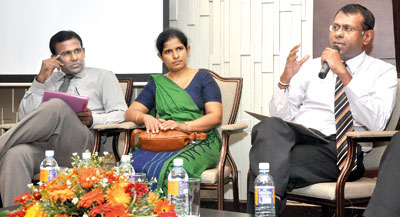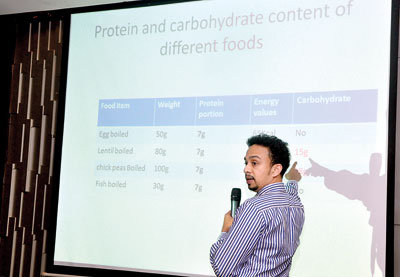Trade unions, senior citizens’ groups should promote consumer protection
View(s):With the lack of consumer protection groups in Sri Lanka, organisations such as trade unions and senior citizens’ civil societies, comprising retired principals, journalists, lawyers, etc should take up this cause, according to Bandula Chandrasekera, Advisor, National Electricity Consumers’ Movement (NECM).
Mr. Chandrasekera made this recommendation at the Sunday Times Business Club discussion on “Consumerism – Obligations of Marketers, Producers and Rights of Consumers” held last week, wherein he was joined by fellow panellists Chandrika Thilakaratne, Director of Consumer Affairs and Information, Consumer Affairs Authority (CAA), and Thilanka De Zoysa, Managing Director, Convenience Foods (Lanka) PLC.
Commenting further, Mr. Chandrasekera also opined that Sri Lanka does not have consumer protection societies as the country’s current socio-economic landscape stops their development. He also put the blame for inadequate consumer protection on the lack of good governance,

From left: Bandula Chandrasekera, Ms. Chandrika Thilakaratne and Thilanka de Zoysa. Pic by Nilan Maligaspe
transparency, etc as well as political patronage of some wrongdoers and a related culture that has impinged on these types of problems being solved.
Also speaking at the event, Ms. Thilakaratne stated that the mandate of the CAA was to protect consumers from hazardous products while keeping the marketplace competitive in terms of price. However, she was the first to also admit that consumer protection is not very strong in Sri Lanka even though the CAA has been in existence for over 10 years.
Elaborating, she said that, as the CAA, they could facilitate consumer rights groups but after that these organisations had to develop their own programmes and grow as a voluntary group. That is how these organisations had taken root in other countries. Additionally, she also stated that, for 2015, the CAA would work according to a different strategy, promoting a few model consumer societies in the beginning so that this concept grows.
Another panellist, Mr. De Zoysa, who spoke on behalf of marketers and producers at the forum, commented that, as a company, they had to make profits but their business also had to remain sustainable. As such, their livelihoods depended on the continued patronage of their customers.
He also opined that their customers did not know much about ISO and SLS certifications, and the fact that these were audited annually to maintain consistent high quality. Further, he recommended that the government and related authorities create awareness about these standards while also making these types of certifications mandatory.
Meanwhile, Ms. Thilakaratne talked about the rights of the consumer as well as some of the incidents of violation of these rights experienced first-hand by the CAA. She said the Sri Lankan consumer has eight rights, one of the major ones being the right to get information before purchasing the product. Another was the right to safe products. And these rights are frequently being challenged in the markets. The CAA has detected cases where expiration dates were changed, etc as well as, recently, rice and chilli powder being mixed with adulterants such as textile dyes. There was even a case where coconut oil was mixed with low quality palm oil.
She also highlighted the recent high-profile DCD (dicyandiamide) contaminated milk powder issue wherein the CAA initially tested five brands, with all showing levels of DCD when tested. She further opined that these could not be banned as this situation was unprecedented so they had to involve the country’s Health Ministry, which in turn sought the opinion of the World Health Organisation, to determine further actions.
Adding to this, Mr. Chandrasekera commented that sellers must have both an eye on their profits as well as the ethics of their enterprise, while buyers must consider benefits as well as possible knock on harm caused by their purchases. He further noted that, with the upcoming festival season, a lot of shoddy goods and services would be available. And consumers will not be vigilant about these nor complain to the state if they buy these problematic merchandise because they feel the government is not sympathetic to their problems.
Mr. Chandrasekera also went on to showcase the current problem of unknown kidney disease in the Rajarata area, attributing it to sub-standard agrochemicals. He commented that 12-13 farmers die every month in those areas and, due to the lack of good governance, and without any political will supporting a change, this situation was likely to continue.
In response to a question from the audience, Ms. Thilakaratne said that laws were in place making it mandatory to mark prices, expiry dates and batch numbers on products. Tampering with these is illegal, with wrongdoers being taken to court as a result. She also noted that, until a product enters the hands of a consumer, all responsibility rested with its manufacturer.
The monthly meeting of the club is hosted by the Cinnamon Lakeside hotel with Commercial Bank as the club co-sponsor. Nestle, Ceylon Biscuits Ltd and Chariot Restaurants supported the event.
(JH)
| Chariot to launch ‘Eat Right’ healthy meals in December sAs a part of a recent presentation by Chariot Restaurants to the audience at the Sunday Times Business Club, the company’s Director Shehan Gomez unveiled the restaurant chain’s new “Eat Right” healthy meals product line, to be available to customers from December 2014 onwards. Developed in conjunction with Clinical Nutritionist Dr. Ranil Jayawardena, the meals offer a nutritious alternative, delivered right to a customer’s door. There are also plans to add meals options for people with special dietary requirement such as heart patients, etc. Speaking at the event, Dr. Jayawardena noted that Sri Lanka’s health parameters are comparable with developing countries. And these parameters are maintained at a much lower cost than these countries. E.g. Australia spends 20 times what Sri Lanka does for more or less than same health parameters.  Clinical Nutritionist Dr. Ranil Jayawardena during his presentation. However, he also indicated that, when it came to cardio vascular disease, such as strokes, Sri Lanka had almost twice as high a prevalence of these compared to countries in Europe. He also said that, while malnutrition and infection-related diseases had reduced, non-communicable diseases (NCDs) such as heart disease, obesity, diabetes, hypertension, pressure, etc had increased, mostly due to diet. He also noted that 11 per cent of the population had diabetes in Sri Lanka, higher than in Japan, Europe, USA and the UK. Dr. Jayawardena added that, based on a per plate nutrition model, each meal should consist of two parts vegetables, one part carbohydrates and one part protein. But a big issue was that most of Sri Lanka’s traditional dinners were mostly carbohydrates heavy. Great for farmers but, as Sri Lankans are no longer mostly farmers, it is no longer ideal. As such, one important problem that has emerged is that Sri Lankans eat a large dinner which directly leads to heart disease because when a large carbohydrate meal is consumed it converts into glucose and there is no chance to burn it off. Even in healthy people, consuming this quantity of carbohydrates for long periods is not good. Also, Sri Lankans are very low in terms of meat consumption (high quality protein). Most Sri Lankans consume protein in the form of pulses, such as dhal, etc which are also high in carbohydrates. And these are not eaten in high enough quantities to meet the daily requirements.Additionally, fruit and vegetable consumption is also very low. In terms of high quality vegetable protein, the best sources are tofu, mushrooms, dambala (winged beans), long beans, etc. |


